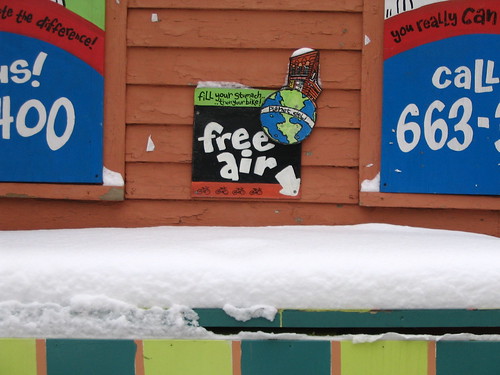Free Air
Free Press co-founders Robert W. McChesney and John Nichols spoke at the University of Michigan tonight, not about free air, but about freedom of the press. Mostly, the presented the argument they developed in their new book, Tragedy & Farce.
They talked about the history of journalism, focusing on the development of professional journalism in the early 20th century. They then spoke of the reason that professional journalism was superior to the journalism that preceded it, but also of the problems that it introduced. Those problems, they argue, have caused the media to drift away from their mission of promoting democratic principles.
The Tragedy part of their book deals with how the media were complicit in selling the Iraq war to the American people. The Farce part addresses the way in which the media allow those in power to define the terms of our political discourse. Those in power are the ones who decide what is newsworthy, and what is not. This, they argue, promotes the dilution of political debate. Rather than people considering the full range of issues that are important, they follow the one or two topics that those in power want to emphasize.
The media do not report about politics; they act as stenographers for those who are already in power. They do not present the public with the issues that voters need to know in order to make informed decisions in the voting booth. Instead, they turn political campaigns into popularity contests. (Don't be surprised if the 2008 Presidential campaign includes a swimsuit contest.)
McChesney and Nichols concluded by talking about one hopeful development. You may recall how, a couple of years ago, there was a proposal in front of the FCC that would allow greater consolidation of media companies. That proposal failed. It failed because of grassroots opposition that included both ends of the political spectrum. They are hopeful that this will crystallize into a movement that promotes media reform.
One thing that they did not talk about tonight was the topic of Free Air. Fortunately, they have a lot to say about the topic on their website, Freepress.net.
From time to time, we see ad campaigns that trumpet opposition to community wireless "internets" access. The opposition to free wireless broadband access is generated by media conglomerates who stand to lose profits if people have control over their own access to news and entertainment. Those trumpets can be ignored for now, although as more communities gear up to provide the service, it is likely that the big media companies will roll out a major media blitz of opposition. Needless to say, there is no reason to pay any attention to what they want. We need to focus on what we want.
If the major media sources had been doing their job, I might consider pitching in to protect their revenue stream. But since they have failed miserably, they will have to fend for themselves.



 :
Joseph j7uy5
:
Joseph j7uy5
<< Home